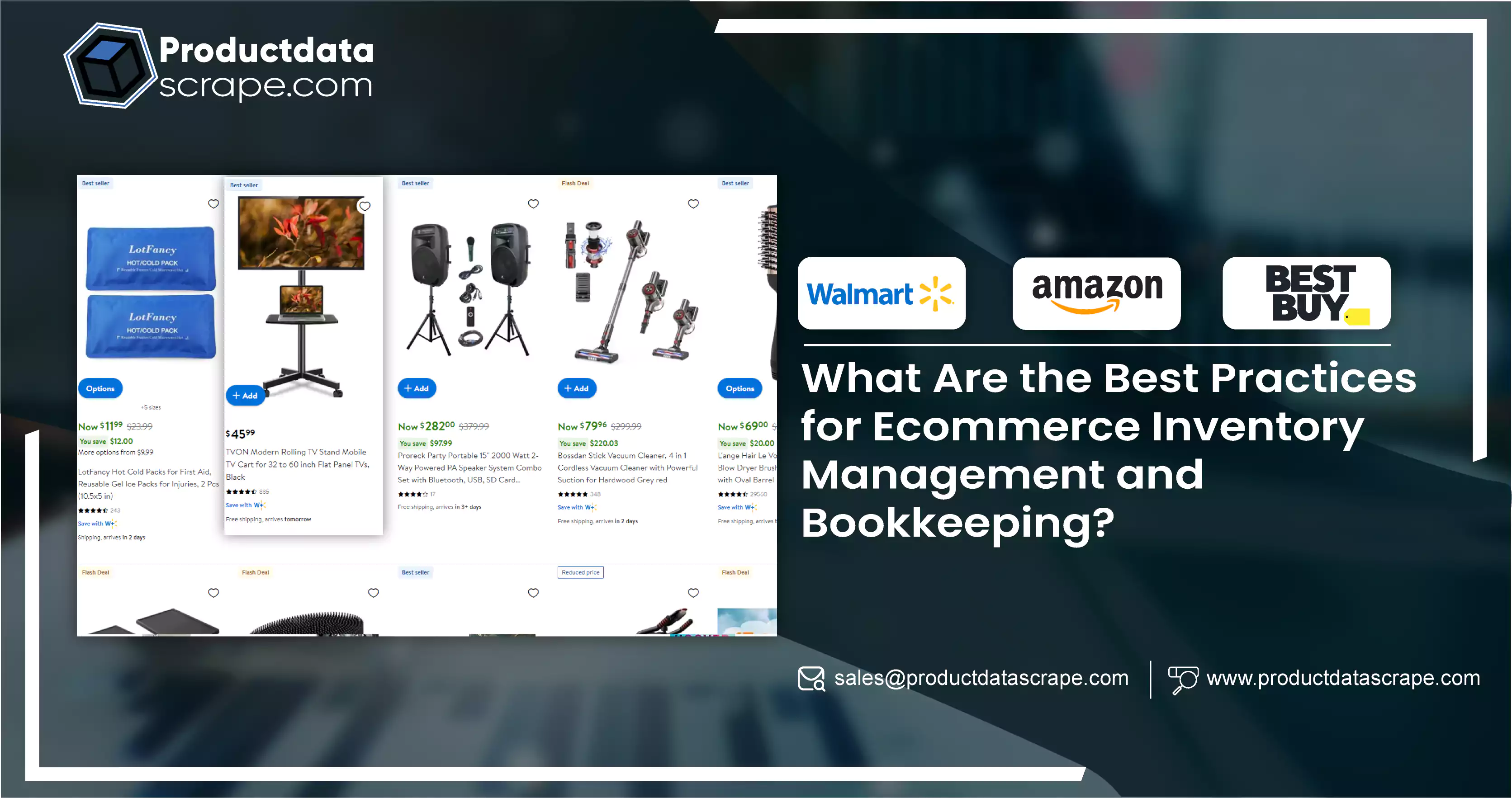
In the rapidly evolving ecommerce landscape, Ecommerce inventory management and bookkeeping are pivotal for maintaining operational efficiency and financial accuracy. As online retail expands, managing vast amounts of inventory and financial data becomes increasingly complex. Many e-commerce businesses leverage data scraping tools to address these challenges and optimize their processes. Companies can streamline their operations and enhance accuracy by using these tools to scrape ecommerce inventory management and bookkeeping data.
Ecommerce inventory management and bookkeeping data scraping offer significant advantages, such as real-time data updates, improved inventory tracking, and automated financial record-keeping. These tools can collect data from various sources, including competitor websites and online marketplaces, providing valuable insights into stock levels, pricing, and financial transactions.
However, implementing data scraping comes with challenges, including ensuring data accuracy, adhering to legal and ethical standards, and managing data security. Adopting best practices, such as using reliable tools, verifying data sources, and maintaining compliance, is crucial for maximizing the benefits of data scraping. By integrating these advanced techniques, ecommerce businesses can enhance their inventory and bookkeeping processes, leading to greater efficiency and competitive advantage.
Understanding Ecommerce Inventory Management
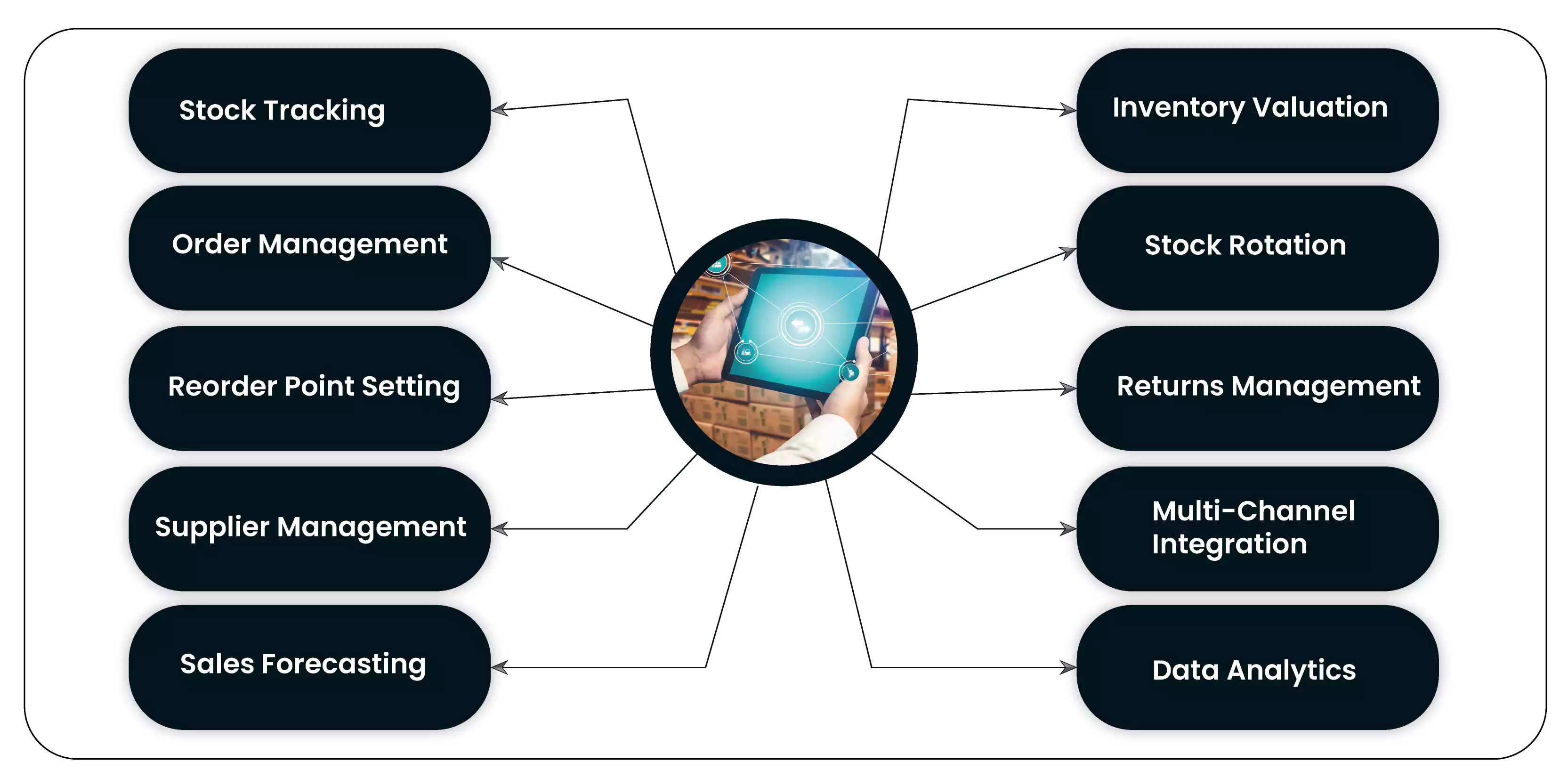
Inventory Management is a fundamental aspect of ecommerce that involves tracking and controlling stock levels to ensure that products are available for customers while minimizing excess inventory. Effective inventory management helps businesses balance supply and demand, reduce costs, and improve customer satisfaction. Here are ten critical components of inventory management, each enhanced by advanced techniques such as ecommerce stock management and bookkeeping extraction:
1.Stock Tracking: Monitoring stock levels in real-time to prevent overstocking or stockouts. Effective ecommerce inventory management ensures that inventory levels are updated instantly, reducing the risk of losing sales or overburdening storage with excess stock.
2.Order Management: Processing and fulfilling orders efficiently to keep customers satisfied. Utilizing tools to scrape ecommerce inventory management data helps streamline order processing by providing up-to-date stock information, minimizing errors and delays.
3.Reorder Point Setting: Determining optimal stock levels to trigger automatic reordering. Businesses can optimize reorder points and balance supply and demand by leveraging extract inventory management for increased profitability.
4.Supplier Management: involves coordinating with suppliers to ensure timely product delivery. Scrape bookkeeping for eCommerce businesses can help track supplier transactions and manage relationships effectively, ensuring timely inventory replenishment.
5.Sales Forecasting: Analyzing historical data to predict future demand and adjust inventory accordingly. Advanced analytics tools enable businesses to extract inventory management for increased profitability, improving forecasting accuracy and inventory planning.
6.Inventory Valuation: Assessing the value of inventory to manage financial performance. By incorporating ecommerce stock management and bookkeeping extraction, businesses can accurately value their inventory and understand cost structures
7.Stock Rotation: Implementing strategies to rotate stock and manage shelf life. Tools that scrape ecommerce inventory management data can assist in managing stock rotation, ensuring that older products are sold before new inventory is introduced.
8.Returns Management: Handling returned items effectively to maintain accurate inventory levels. It helps track returns and adjust inventory levels, improving overall inventory accuracy.
9.Multi-Channel Integration: Synchronizing inventory across multiple sales channels. These tools ensure that stock levels are updated in real-time across all platforms, preventing overselling and stock discrepancies.
10.Data Analytics: Using data analytics to gain insights into inventory performance. Advanced techniques provide valuable insights that help optimize inventory practices and drive business growth.
These advanced scraping and extraction techniques can significantly enhance inventory management practices, making processes more efficient and profitable.
The Role of Bookkeeping in Ecommerce
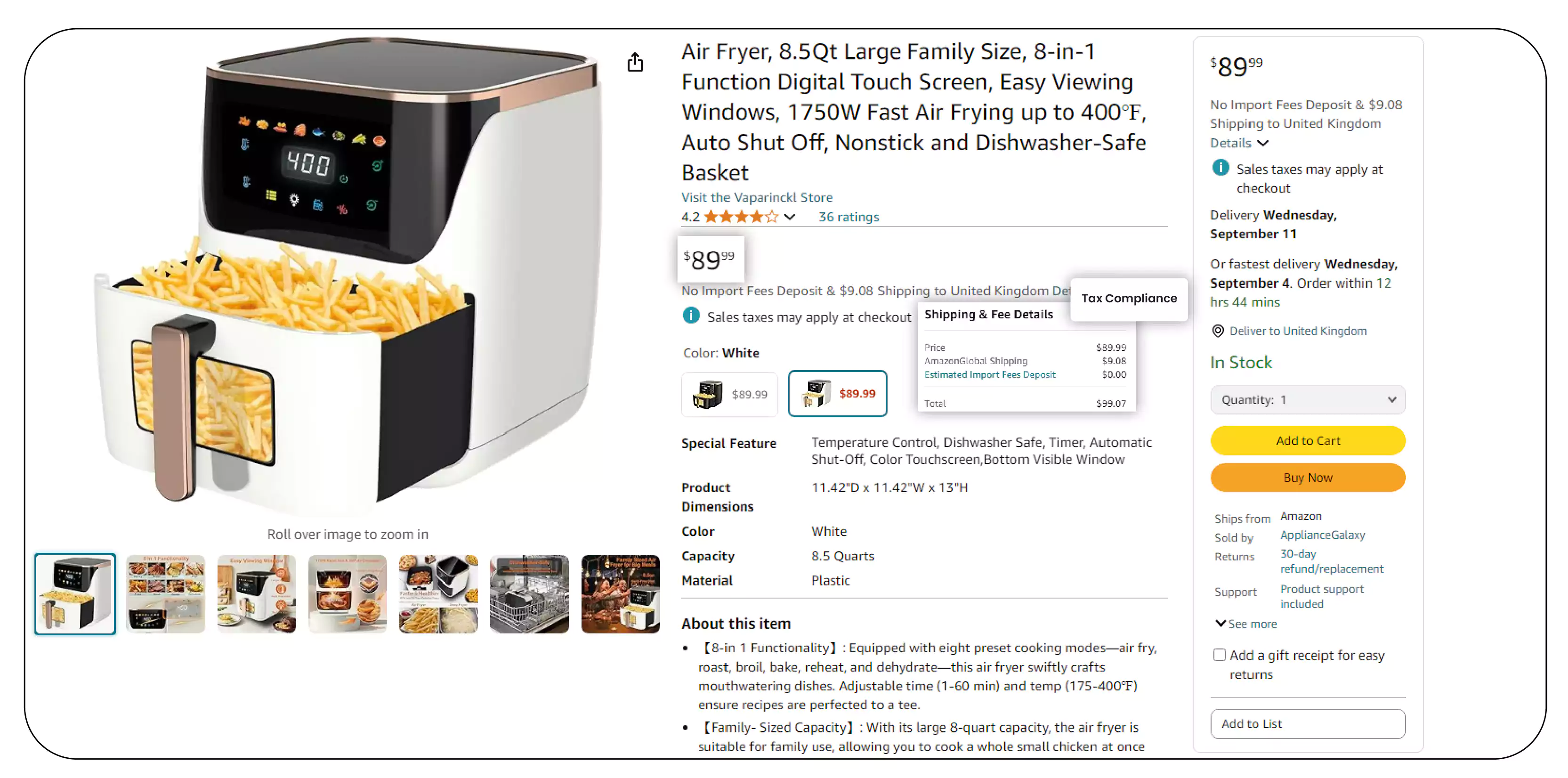
Bookkeeping is essential for maintaining an ecommerce business's financial health. It involves recording, classifying, and summarizing financial transactions to ensure accurate financial statements and compliance with tax regulations. Proper bookkeeping helps ecommerce businesses track their financial activities effectively, providing insights into profitability, cost management, and financial stability. Critical aspects of bookkeeping in ecommerce include:
1.Revenue Tracking: Recording sales transactions and monitoring revenue streams are fundamental for understanding business performance. Using tools to scrape ecommerce financial records can automate capturing and categorizing sales data from various platforms, ensuring that all revenue is accurately tracked and reported.
2.Expense Management: Managing operational costs is critical for maintaining profitability. This includes tracking inventory purchases, shipping fees, and marketing expenses. Advanced solutions like ecommerce stock control and accounting data scraping help streamline expense management by extracting data from invoices and financial records, providing a clear picture of operational costs.
3.Financial Reporting: Generating financial statements, including profit and loss statements and balance sheets, is essential for assessing the business's financial health. Ecommerce product data scraping services can help compile and summarize financial data, enabling accurate and timely financial reporting.
4.Tax Compliance: Ensuring accurate reporting of income and expenses is crucial for meeting tax obligations. Web scraping e-commerce websites can assist in gathering detailed financial records and transactions, facilitating precise tax calculations and compliance with regulatory requirements.
5.Reconciliation: Matching financial records with bank statements helps identify discrepancies and ensures accurate accounts. Ecommerce financial records and stock data scraper can automate reconciliation by cross-referencing transaction data with bank statements, reducing errors and saving time.
By incorporating advanced scraping tools and techniques, ecommerce businesses can enhance their bookkeeping practices, ensuring accurate financial management and improved operational efficiency.
How Data Scraping Enhances Inventory Management

Data scraping involves collecting information from websites or other online sources using automated tools. In the realm of inventory management, data scraping offers several benefits that enhance control and efficiency:
1.Real-Time Stock Updates: By scraping competitor websites and online marketplaces, businesses can track competitors' inventory levels and pricing strategies in real-time. This allows for timely adjustments to stock levels and pricing strategies, helping to stay competitive in the market. The ability to extract inventory management data for ecommerce enables businesses to make informed decisions about inventory restocking and pricing.
2.Supplier Data Extraction: Scraping supplier websites provides access to updated product catalogs, prices, and availability. This information is crucial for managing supplier relationships and making informed purchasing decisions. By continuously extracting data, businesses can ensure they have the latest product offerings and pricing information, which aids in effective inventory management.
3.Sales and Demand Analysis: Data scraping tools can gather sales data from ecommerce platforms, allowing businesses to analyze customer preferences, buying patterns, and seasonal trends. This analysis helps optimize inventory levels and improve sales forecasts. Understanding demand patterns through data scraping supports better inventory planning and stock allocation.
4.Price Monitoring: Price monitoring through data scraping offers valuable insights into market trends. By monitoring competitors' pricing, businesses can adjust their pricing strategies to remain competitive. This ensures that products are priced appropriately according to market conditions and helps maintain profitability.
5.Automated Reporting: Data scraping can automate inventory data collection, significantly reducing manual data entry and minimizing errors. Automated reports provide real-time insights into stock levels, order statuses, and inventory turnover. This streamlining of reporting processes enables more efficient management and quicker decision-making.
By leveraging data scraping techniques, businesses can enhance their ecommerce inventory management practices, leading to better stock control, pricing strategies, and overall operational efficiency.
How Data Scraping Enhances Bookkeeping

Data scraping can significantly enhance bookkeeping processes by automating data extraction and reducing manual effort. Here's how it improves various aspects of bookkeeping:
1.Transaction Recording: Scraping sales data from ecommerce platforms and payment gateways automates the recording of transactions into accounting software. This ensures accurate and up-to-date financial records, eliminating the need for manual entry and reducing the risk of errors. By implementing inventory and bookkeeping scraping for online stores, businesses streamline the recording of financial transactions, enhancing overall accuracy.
2.Expense Tracking: Data scraping can collect expense details from invoices, receipts, and vendor websites, simplifying the expense tracking process. This ensures that all financial transactions are accounted for and reduces the administrative burden of manual data entry. Accurate expense tracking supports better financial management and aids in maintaining a clear view of operational costs.
3.Financial Reconciliation: Scraping data from bank accounts and payment processors facilitates reconciliation by matching recorded transactions with bank statements. This process helps identify discrepancies and ensures accurate financial reporting. By automating this task, businesses can more efficiently manage their financial records and maintain accuracy in their reporting.
4.Tax Compliance: Scraping tools can collect relevant financial data for tax reporting, such as sales tax and VAT information. This automation helps ensure compliance with tax regulations and simplifies the preparation of tax documents. By leveraging scraping for tax-related data, businesses can reduce the complexity of tax compliance and avoid potential issues with regulatory authorities.
5.Customized Reporting: It allows for extracting financial data into customizable reports. Businesses can generate detailed financial statements, profit and loss reports, and cash flow statements tailored to their needs. This customization supports better financial analysis and decision-making, providing insights into business performance and aiding in strategic planning.
Businesses can optimize their operations, enhance accuracy, and improve financial oversight by utilizing data scraping for inventory management and bookkeeping. This approach streamlines processes and supports effective pricing strategies and operational efficiency.
Benefits of Data Scraping for Inventory Management and Bookkeeping

1.Increased Efficiency: Automating data extraction reduces the time and effort required for manual data entry and reporting. This allows businesses to focus on strategic decision-making and operational improvements.
2.Improved Accuracy: Data scraping minimizes human errors associated with manual data entry, ensuring more accurate inventory and financial records.
3.Real-Time Insights: Access to real-time data allow businesses to make valuable decisions quickly, adapt to market changes, and respond to customer needs more effectively.
4.Cost Savings: Data scraping can reduce manual labor and streamline processes, leading to cost savings in inventory management and bookkeeping operations.
5.Competitive Advantage: Access to competitive pricing and inventory data helps businesses stay ahead of competitors and optimize their pricing and stock strategies.
Challenges of Data Scraping
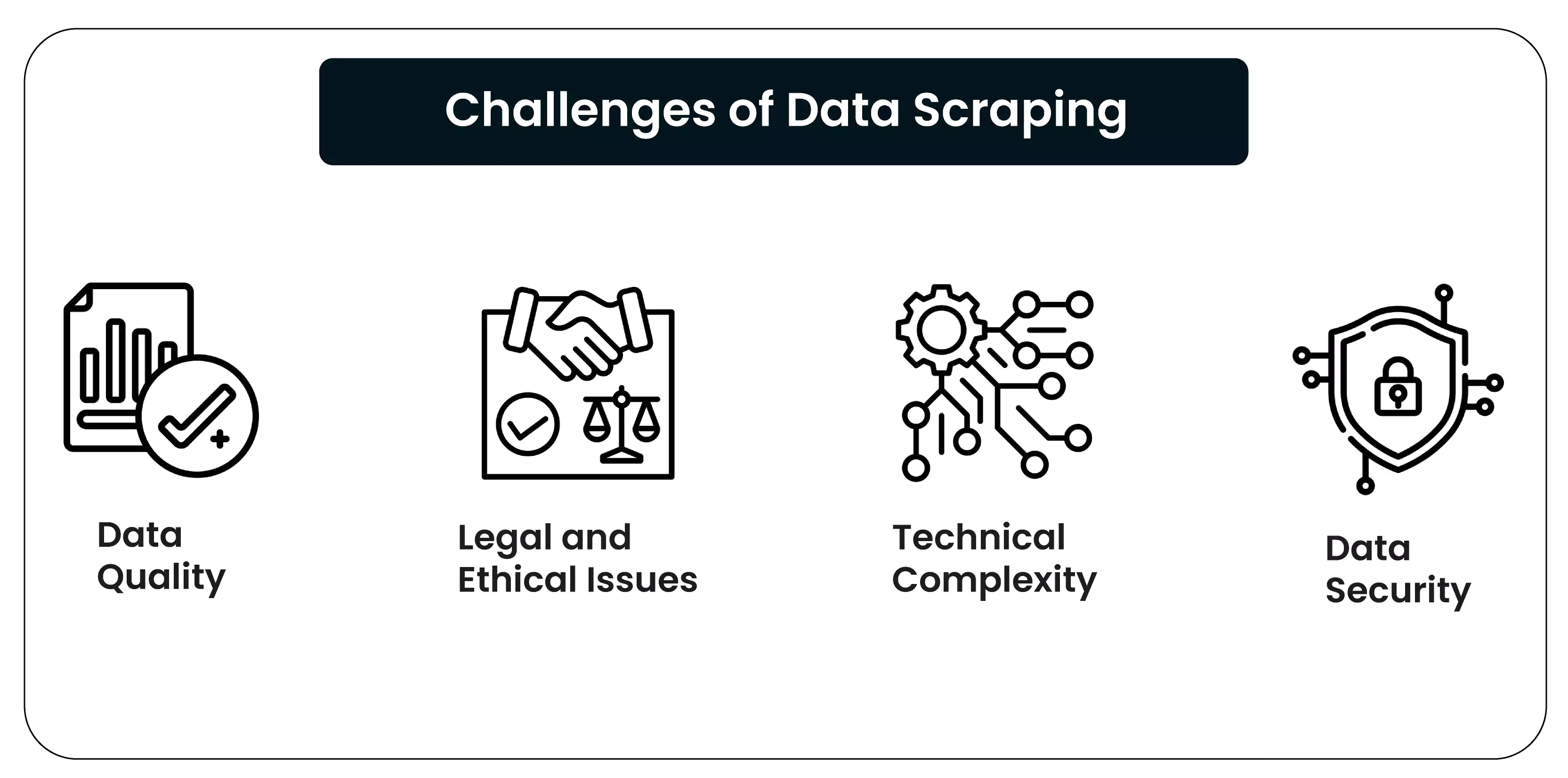
While data scraping offers numerous benefits, there are also challenges to consider:
1.Data Quality: The accuracy and reliability of scraped data depend on the quality of the source websites. Only accurate or updated information can lead to correct inventory and financial records.
2.Legal and Ethical Issues: Scraping data from websites without permission may violate terms of service or intellectual property rights. Businesses must ensure that their data scraping practices comply with legal and ethical standards.
3.Technical Complexity: Implementing and maintaining data scraping tools requires technical expertise and ongoing adjustments to handle website changes and updates.
4.Data Security: Handling large volumes of sensitive data requires robust security measures to protect against data breaches and unauthorized access.
Best Practices for Implementing Data Scraping
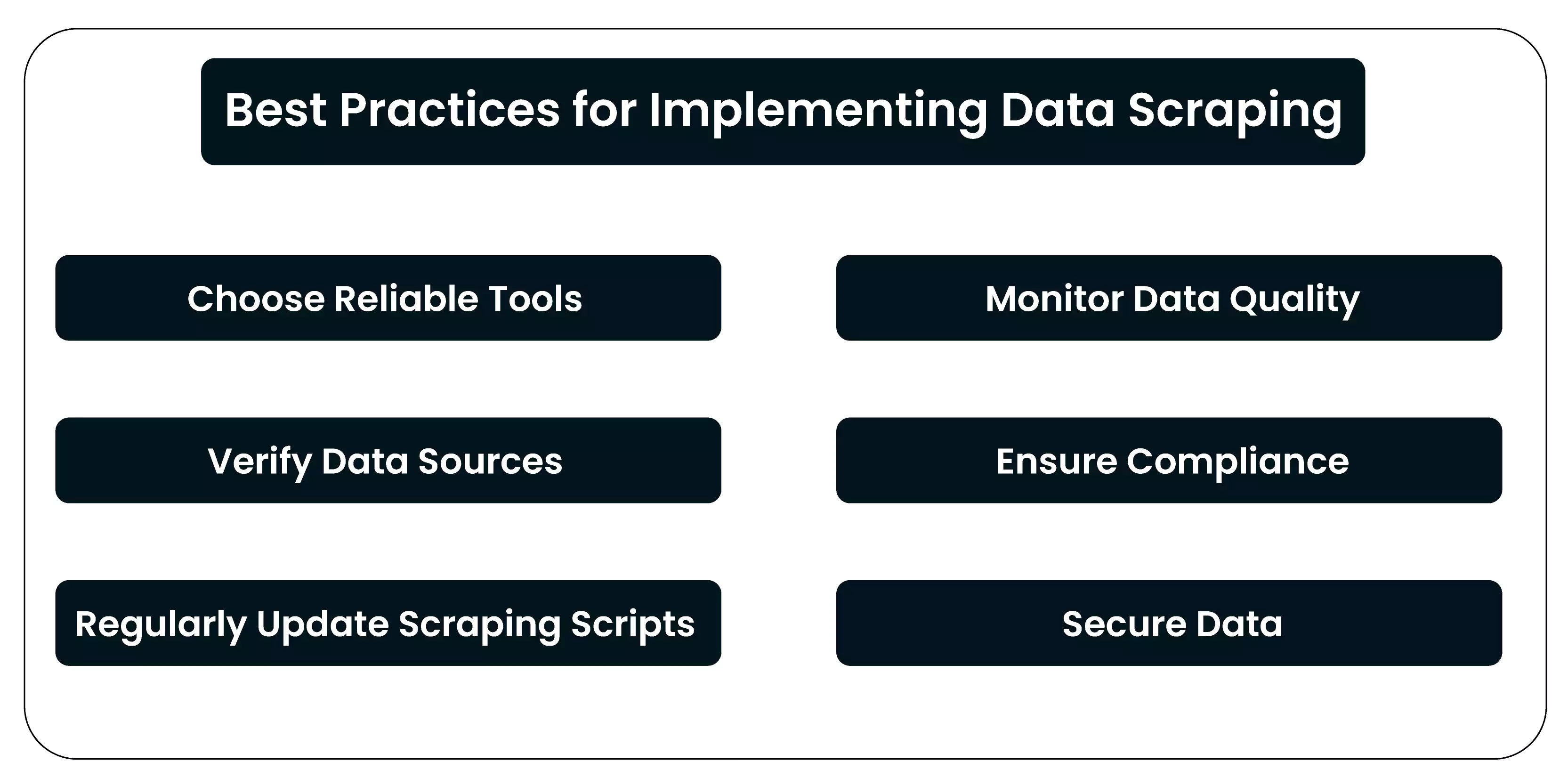
1.Choose Reliable Tools: Select reputable data scraping tools that offer accuracy, reliability, and compliance with legal and ethical standards.
2.Verify Data Sources: Ensure that the data sources you scrape from are trustworthy and provide accurate information.
3.Regularly Update Scraping Scripts: Websites frequently change their structure, so updating your scraping scripts to accommodate these changes and maintain data accuracy is essential.
4.Monitor Data Quality: Regularly review and validate the accuracy of scraped data to ensure that it meets your business needs.
5.Ensure Compliance: Adhere to legal and ethical guidelines for data scraping, including obtaining permissions where necessary and respecting website terms of service.
6.Secure Data: Implement strong security measures to protect scraped data and prevent unauthorized access or breaches.
Conclusion
In the dynamic world of ecommerce, effective e-commerce inventory Management and Bookkeeping are essential for business success. Data scraping provides valuable tools for enhancing these processes by automating data extraction, improving accuracy, and offering real-time insights. Businesses can streamline operations, make informed decisions, and maintain a competitive edge by leveraging data scraping. However, it is essential to address the challenges associated with data scraping, such as data quality, legal compliance, and security, to realize its benefits fully. With the right tools and best practices, ecommerce businesses can optimize their inventory and financial management, driving growth and profitability in 2024 and beyond.
At Product Data Scrape, we strongly emphasize ethical practices across all our services, including Competitor Price Monitoring and Mobile App Data Scraping. Our commitment to transparency and integrity is at the heart of everything we do. With a global presence and a focus on personalized solutions, we aim to exceed client expectations and drive success in data analytics. Our dedication to ethical principles ensures that our operations are both responsible and effective.








































.webp)




.webp)
.webp)
.webp)